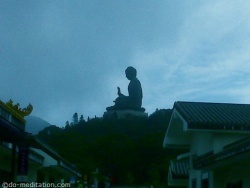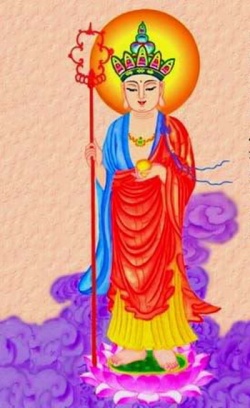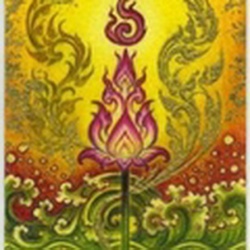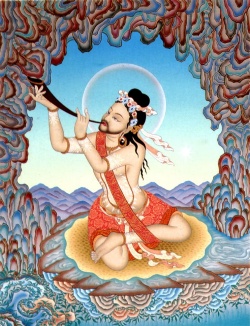Difference between revisions of "Dhammika Sutta"
| (One intermediate revision by one other user not shown) | |||
| Line 9: | Line 9: | ||
[[Thus have I heard]]. At one [[time]] the [[Lord]] was staying near [[Savatthi]] in the [[Jeta Grove]] at [[Anathapindika's monastery]]. Now the lay-follower [[Dhammika]] with five hundred other lay-followers approached the [[Lord]]. Having drawn near and having saluted the [[Lord]] respectfully he sat down at one side. Sitting there the lay-follower [[Dhammika]] addressed the [[Lord]] as follows: | [[Thus have I heard]]. At one [[time]] the [[Lord]] was staying near [[Savatthi]] in the [[Jeta Grove]] at [[Anathapindika's monastery]]. Now the lay-follower [[Dhammika]] with five hundred other lay-followers approached the [[Lord]]. Having drawn near and having saluted the [[Lord]] respectfully he sat down at one side. Sitting there the lay-follower [[Dhammika]] addressed the [[Lord]] as follows: | ||
| − | "I ask [[Gotama]] [1] of extensive [[wisdom]] this: How acting is a [[disciple]] [[virtuous]] — both the [[disciple]] who has gone from home to the [[homeless]] state and the followers who are householders? For you clearly understand the {{Wiki|behavior}} [2] of the [[world]] with the [[devas]] and the final [[release]]. There is none {{Wiki|equal}} to you who are [[skilled]] in [[seeing]] what is profound. You are an illustrious [[Awakened One]] ([[Buddha]]). Having investigated all [[knowledge]] and being [[compassionate]] towards [[beings]] you have announced the [[Dhamma]], a revealer of what is hidden, of comprehensive [[vision]], stainless, you [[illuminate]] all the [[worlds]]. | + | "I ask [[Gotama]] [1] of extensive [[wisdom]] this: How acting is a [[disciple]] [[virtuous]] — both the [[disciple]] who has gone from home to the [[homeless]] [[state]] and the followers who are householders? For you clearly understand the {{Wiki|behavior}} [2] of the [[world]] with the [[devas]] and the final [[release]]. There is none {{Wiki|equal}} to you who are [[skilled]] in [[seeing]] what is profound. You are an illustrious [[Awakened One]] ([[Buddha]]). Having investigated all [[knowledge]] and being [[compassionate]] towards [[beings]] you have announced the [[Dhamma]], a revealer of what is hidden, of comprehensive [[vision]], stainless, you [[illuminate]] all the [[worlds]]. |
"This [[Dhamma]], {{Wiki|subtle}} and [[pleasing]] and [[taught]] so clearly by you, [[Lord]], it is this we all wish to hear. Having been questioned, foremost [[Awakened One]], tell us (the answer). All these [[bhikkhus]] and also the layfollowers who have come to hear the [[truth]], let them listen to the [[Dhamma]] [[awakened]] to (anubuddham) by the Stainless One as the [[devas]] listen to the well-spoken words of [[Vasava]]." [3] | "This [[Dhamma]], {{Wiki|subtle}} and [[pleasing]] and [[taught]] so clearly by you, [[Lord]], it is this we all wish to hear. Having been questioned, foremost [[Awakened One]], tell us (the answer). All these [[bhikkhus]] and also the layfollowers who have come to hear the [[truth]], let them listen to the [[Dhamma]] [[awakened]] to (anubuddham) by the Stainless One as the [[devas]] listen to the well-spoken words of [[Vasava]]." [3] | ||
| − | (The [[Lord]]:) "Listen to me, [[bhikkhus]], I will teach you the [[ascetic]] practice ([[dhamma]] dhutam), the mode of living suitable for those who have gone forth. Do you all bear it in [[mind]]. One who is intent upon what is good and who is thoughtful should practice it. | + | (The [[Lord]]:) "Listen to me, [[bhikkhus]], I will teach you the [[ascetic]] [[practice]] ([[dhamma]] dhutam), the mode of living suitable for those who have gone forth. Do you all bear it in [[mind]]. One who is intent upon what is good and who is thoughtful should [[practice]] it. |
"A [[bhikkhu]] should not wander about at the wrong [[time]] but should walk the village for [[food]] at the right [[time]], as one who goes about at the wrong [[time]] is (liable to be) [[obsessed]] by [[attachment]], therefore [[Awakened Ones]] do not walk (for [[alms]]) at the wrong [[time]]. [4] Sights, {{Wiki|sounds}}, {{Wiki|tastes}}, {{Wiki|scents}} and [[bodily]] contacts overwhelm (the [[minds]] of) [[beings]]. Being rid of [[desire]] for these [[sense objects]], at the right [[time]], one may enter (the village) for the morning meal. Having duly obtained [[food]], going back alone and sitting down in a secluded place, being inwardly thoughtful and not letting the [[mind]] go out to external [[objects]], a [[bhikkhu]] should develop {{Wiki|self-control}}. | "A [[bhikkhu]] should not wander about at the wrong [[time]] but should walk the village for [[food]] at the right [[time]], as one who goes about at the wrong [[time]] is (liable to be) [[obsessed]] by [[attachment]], therefore [[Awakened Ones]] do not walk (for [[alms]]) at the wrong [[time]]. [4] Sights, {{Wiki|sounds}}, {{Wiki|tastes}}, {{Wiki|scents}} and [[bodily]] contacts overwhelm (the [[minds]] of) [[beings]]. Being rid of [[desire]] for these [[sense objects]], at the right [[time]], one may enter (the village) for the morning meal. Having duly obtained [[food]], going back alone and sitting down in a secluded place, being inwardly thoughtful and not letting the [[mind]] go out to external [[objects]], a [[bhikkhu]] should develop {{Wiki|self-control}}. | ||
| Line 21: | Line 21: | ||
"Having heard the [[Dhamma]] [[taught]] by the [[Sugata]] [6] and considered it, a [[disciple]] of Him of {{Wiki|excellent}} [[wisdom]] should wisely make use of [[food]], a dwelling, a bed, a seat and [[water]] for washing the robe. But a [[bhikkhu]] should not be soiled by ([[clinging]] to) these things, as a [[lotus]] is not wetted by a drop of [[water]]. | "Having heard the [[Dhamma]] [[taught]] by the [[Sugata]] [6] and considered it, a [[disciple]] of Him of {{Wiki|excellent}} [[wisdom]] should wisely make use of [[food]], a dwelling, a bed, a seat and [[water]] for washing the robe. But a [[bhikkhu]] should not be soiled by ([[clinging]] to) these things, as a [[lotus]] is not wetted by a drop of [[water]]. | ||
| − | "Now I will tell you the layman's [[duty]]. Following it a [[lay-disciple]] would be [[virtuous]]; for it is not possible for one occupied with the [[household life]] to realize the complete [[bhikkhu]] practice ([[dhamma]]). | + | "Now I will tell you the layman's [[duty]]. Following it a [[lay-disciple]] would be [[virtuous]]; for it is not possible for one occupied with the [[household life]] to realize the complete [[bhikkhu]] [[practice]] ([[dhamma]]). |
"He should not kill a [[living being]], nor [[cause]] it to be killed, nor should he incite another to kill. Do not injure any being, either strong or weak, in the [[world]]. | "He should not kill a [[living being]], nor [[cause]] it to be killed, nor should he incite another to kill. Do not injure any being, either strong or weak, in the [[world]]. | ||
| Line 31: | Line 31: | ||
"Having entered a {{Wiki|royal court}} or a company of [[people]] he should not speak lies. He should not speak lies (himself) nor incite others to do so. He should completely avoid falsehood. | "Having entered a {{Wiki|royal court}} or a company of [[people]] he should not speak lies. He should not speak lies (himself) nor incite others to do so. He should completely avoid falsehood. | ||
| − | "A [[layman]] who has chosen to practice this [[Dhamma]] should not indulge in the drinking of [[intoxicants]]. He should not drink them nor encourage others to do so; [[realizing]] that it leads to madness. Through [[intoxication]] [[foolish]] [[people]] perform [[evil]] [[deeds]] and [[cause]] other heedless [[people]] to do likewise. He should avoid [[intoxication]], this occasion for {{Wiki|demerit}}, which stupefies the [[mind]], and is the [[pleasure]] of [[foolish]] [[people]]. | + | "A [[layman]] who has chosen to [[practice]] this [[Dhamma]] should not indulge in the drinking of [[intoxicants]]. He should not drink them nor encourage others to do so; [[realizing]] that it leads to madness. Through [[intoxication]] [[foolish]] [[people]] perform [[evil]] [[deeds]] and [[cause]] other heedless [[people]] to do likewise. He should avoid [[intoxication]], this [[occasion]] for {{Wiki|demerit}}, which stupefies the [[mind]], and is the [[pleasure]] of [[foolish]] [[people]]. |
[[Do not kill]] a [[living being]]; do not take what is not given; do not speak a lie; do not drink [[intoxicants]]; abstain from {{Wiki|sexual}} intercourse; do not eat [[food]] at night, at the wrong [[time]]; do not wear flower-garlands nor use [[perfumes]]; use the ground as a bed or [[sleep]] on a mat. | [[Do not kill]] a [[living being]]; do not take what is not given; do not speak a lie; do not drink [[intoxicants]]; abstain from {{Wiki|sexual}} intercourse; do not eat [[food]] at night, at the wrong [[time]]; do not wear flower-garlands nor use [[perfumes]]; use the ground as a bed or [[sleep]] on a mat. | ||
| − | "This is called the eight-factored [[observance]] made known by the [[Awakened One]] who has reached the | + | "This is called the eight-factored [[observance]] made known by the [[Awakened One]] who has reached the end of [[suffering]]. |
"With a gladdened [[mind]] observe the [[observance day]] ([[uposatha]]), complete with its eight factors, on the fourteenth, fifteenth and eighth days of the ([[lunar]]) fortnight and also the special holiday of the half month. In the morning, with a [[pure]] [[heart]] and a [[joyful]] [[mind]], a [[wise]] man, after observing the [[uposatha]], should distribute suitable [[food]] and drink to the {{Wiki|community}} of [[bhikkhus]]. He should support his mother and father as his [[duty]] and engage in lawful trading. A [[layman]] who carries this out diligently goes to the [[devas]] called "Self-radiant." [7] | "With a gladdened [[mind]] observe the [[observance day]] ([[uposatha]]), complete with its eight factors, on the fourteenth, fifteenth and eighth days of the ([[lunar]]) fortnight and also the special holiday of the half month. In the morning, with a [[pure]] [[heart]] and a [[joyful]] [[mind]], a [[wise]] man, after observing the [[uposatha]], should distribute suitable [[food]] and drink to the {{Wiki|community}} of [[bhikkhus]]. He should support his mother and father as his [[duty]] and engage in lawful trading. A [[layman]] who carries this out diligently goes to the [[devas]] called "Self-radiant." [7] | ||
Latest revision as of 23:07, 16 March 2015
Dhammika Sutta: Dhammika
(excerpt)
translated from the Pali by
John D. Ireland
© 1994
Thus have I heard. At one time the Lord was staying near Savatthi in the Jeta Grove at Anathapindika's monastery. Now the lay-follower Dhammika with five hundred other lay-followers approached the Lord. Having drawn near and having saluted the Lord respectfully he sat down at one side. Sitting there the lay-follower Dhammika addressed the Lord as follows:
"I ask Gotama [1] of extensive wisdom this: How acting is a disciple virtuous — both the disciple who has gone from home to the homeless state and the followers who are householders? For you clearly understand the behavior [2] of the world with the devas and the final release. There is none equal to you who are skilled in seeing what is profound. You are an illustrious Awakened One (Buddha). Having investigated all knowledge and being compassionate towards beings you have announced the Dhamma, a revealer of what is hidden, of comprehensive vision, stainless, you illuminate all the worlds.
"This Dhamma, subtle and pleasing and taught so clearly by you, Lord, it is this we all wish to hear. Having been questioned, foremost Awakened One, tell us (the answer). All these bhikkhus and also the layfollowers who have come to hear the truth, let them listen to the Dhamma awakened to (anubuddham) by the Stainless One as the devas listen to the well-spoken words of Vasava." [3]
(The Lord:) "Listen to me, bhikkhus, I will teach you the ascetic practice (dhamma dhutam), the mode of living suitable for those who have gone forth. Do you all bear it in mind. One who is intent upon what is good and who is thoughtful should practice it.
"A bhikkhu should not wander about at the wrong time but should walk the village for food at the right time, as one who goes about at the wrong time is (liable to be) obsessed by attachment, therefore Awakened Ones do not walk (for alms) at the wrong time. [4] Sights, sounds, tastes, scents and bodily contacts overwhelm (the minds of) beings. Being rid of desire for these sense objects, at the right time, one may enter (the village) for the morning meal. Having duly obtained food, going back alone and sitting down in a secluded place, being inwardly thoughtful and not letting the mind go out to external objects, a bhikkhu should develop self-control.
"If he should speak with a lay-disciple, with someone else or with another bhikkhu, he should speak on the subtle Dhamma, not slandering others nor gossiping. Some set themselves up as disputants in opposition to others; those of little wisdom we do not praise; attachments bind them and they are carried away by their emotions. [5]
"Having heard the Dhamma taught by the Sugata [6] and considered it, a disciple of Him of excellent wisdom should wisely make use of food, a dwelling, a bed, a seat and water for washing the robe. But a bhikkhu should not be soiled by (clinging to) these things, as a lotus is not wetted by a drop of water.
"Now I will tell you the layman's duty. Following it a lay-disciple would be virtuous; for it is not possible for one occupied with the household life to realize the complete bhikkhu practice (dhamma).
"He should not kill a living being, nor cause it to be killed, nor should he incite another to kill. Do not injure any being, either strong or weak, in the world.
"A disciple should avoid taking anything from anywhere knowing it (to belong to another). He should not steal nor incite another to steal. He should completely avoid theft.
"A wise man should avoid unchastity as (he would avoid falling into) a pit of glowing charcoal. If unable to lead a celibate life, he should not go to another's wife.
"Having entered a royal court or a company of people he should not speak lies. He should not speak lies (himself) nor incite others to do so. He should completely avoid falsehood.
"A layman who has chosen to practice this Dhamma should not indulge in the drinking of intoxicants. He should not drink them nor encourage others to do so; realizing that it leads to madness. Through intoxication foolish people perform evil deeds and cause other heedless people to do likewise. He should avoid intoxication, this occasion for demerit, which stupefies the mind, and is the pleasure of foolish people.
Do not kill a living being; do not take what is not given; do not speak a lie; do not drink intoxicants; abstain from sexual intercourse; do not eat food at night, at the wrong time; do not wear flower-garlands nor use perfumes; use the ground as a bed or sleep on a mat.
"This is called the eight-factored observance made known by the Awakened One who has reached the end of suffering.
"With a gladdened mind observe the observance day (uposatha), complete with its eight factors, on the fourteenth, fifteenth and eighth days of the (lunar) fortnight and also the special holiday of the half month. In the morning, with a pure heart and a joyful mind, a wise man, after observing the uposatha, should distribute suitable food and drink to the community of bhikkhus. He should support his mother and father as his duty and engage in lawful trading. A layman who carries this out diligently goes to the devas called "Self-radiant." [7]
Notes
1.
Gotama is the Buddha's clan or family name.
2.
According to the commentary, the Pali term "gati" translated here as "behavior" means either "trend of character" or "the destination of beings after death.
3.
"Vasava" is one of the several names for Sakka, ruler of the devas or gods. This is a poetical way of saying they should listen very attentively.
4.
The right time for going into the village to collect almsfood is in the forenoon. If a bhikkhu went about indiscriminately, "at the wrong time," he might see things or have experiences that would endanger his life of purity and cause him to revert to the lay life.
5.
Literally, "they send the mind far."
6.
Sugata, literally "well-gone," sometimes translated as the "Happy One," is an epithet of the Buddha.
7.
A class of heavenly beings (deva). A layman who practices this will, after death, be reborn as one of them.



